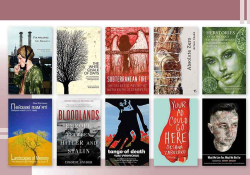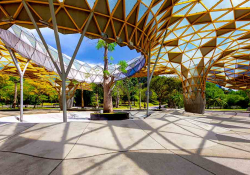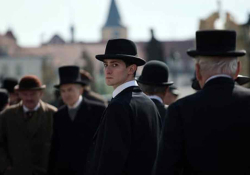"Emerging Ukrainian Women Prose Writers: Twenty Years After Independence"
In the Ukrainian literary tradition there have been scores of women poets, several of them reaching extraordinarily prominent status. The most renowned of them include the legendary seventeenth-century singer and folksong writer Marusia Churai, the poet and dramatist Lesya Ukrayinka at the turn of the nineteenth to the twentieth century, and the poet Lina Kostenko in the Soviet and post-independence period.[1] Yet prose fiction prior to the twentieth century in Ukraine and in the Slavic world by and large has been a genre in the domain of male writers.
The tradition of Ukrainian women’s prose fiction has been considerably less developed than the poetic tradition. Language Lanterns Publications in Canada includes the following women authors in their Women’s Voices in Ukrainian Literature series: Natalia Kobrynska (1855–1920), Dniprova Chayka (1861–1927), Lyubov Yanovska (1861–1933), Olha Kobylianska (1863–1942), Hrytsko Hryhorenko (1867–1924), Yevhenia Yaroshynska (1868–1904), Lesya Ukrainka (1871–1913), and her mother, Olena Pchilka (1849–1930). Only Olha Kobylianska of this group has garnered prominent stature as a prose writer, particularly with the publication of her novels The Land (1902) and On Sunday Morning She Gathered Herbs (1909). Kobylyanska initially wrote in German and switched to Ukrainian as her literary language after she became acquainted with civic-minded Ukrainian literary circles, especially the eminent writer Ivan Franko. One other woman prose writer, Marko Vovchok (1834–1907), the pseudonym of Maria Vilinska, gained prominence in the nineteenth century under the guise of her male mask. She has been called the “Ukrainian Harriet Beecher Stowe” for her realistic, ethnographic short stories on peasant life in Ukraine. First written in Ukrainian—Vovchok’s acquired language following her marriage to Opanas Markovych—these stories were translated and introduced into Russian literary circles with considerable success by the great Russian writer Ivan Turgenev in 1859.
Websites of Ukrainian Women Authors |
|---|
Larysa Denysenko’s website: http://larysa.com.ua/component/option,com_frontpage/Itemid,1 |
Irena Karpa’s website: |
Evhenia Kononenko’s blogsite: |
Maria Matios’s website: |
Svitlana Pyrkalo’s blogsite: |
Iren Rozdobudko’s author’s page: |
Oksana Zabuzhko’s website: |
The Soviet period, unfortunately, witnessed a dearth of influential Ukrainian women prose writers, with the best women writers opting to write poetry. Only two writers prominently stand out during that time period: the émigré poet, prose writer, and artist Emma Andiievska (b. 1931), who was born in Donetsk and emigrated to Germany after World War II, and western Ukrainian writer Nina Bichuya (b. 1937), called the “queen of Ukrainian women’s prose writing” by prominent contemporary Ukrainian writer Valery Shevchuk. All of Andiievska’s surrealistic prose works were written after emigration. Bichuya, who still writes and resides in Lviv, published several books of fiction as well as children’s stories. Like Kobylyanska, she is praised for the psychological depth of her works.
What might the reasons be for the lack of significant Ukrainian women prose writers from the 1920s up to Ukrainian independence in 1991? One can only provide conjecture. Prose fiction requires cultural and societal stability, yet the repressive and congenitally patriarchal nature of the Soviet system may have stereotyped women from working in prose fiction. The same social conditions in Russia during the Soviet period failed to produce any Russian women prose writers of note until the Thaw in the 1960s when I. Grekova (the pseudonym of Elena Venttsel) began publishing, and in the mid- to late 1980s when Ludmilla Petrushevskaya and Tatiana Tolstaya emerged. Petrushevskaya's prose, though accepted for publication as early as 1969 in the leading Soviet journal Novyi mir (New World), was initially withdrawn because of its stark characters and negative depictions of Soviet realia.
Soviet leader Mikhail Gorbachev’s glasnost (openness) period in the mid- to late 1980s and the period of post-independent Ukraine following 1991 have seen a conspicuous blossoming of women prose writers. Two female writers in particular bridged the transitional period to Ukrainian independence: Evhenia Kononenko (b. 1959) and Halyna Pahutiak (b. 1958), who were publishing their short stories and novellas in Soviet periodicals and publishing houses. The Kyiv-based Kononenko was publishing mostly in literary journals such as the liberal Suchasnist in Kyiv, while the Lviv-based Pahutiak, besides publishing in the periodical press, managed to publish several books of collected prose works in Soviet times including Children (1982), The Master (1986), To End Up in a Garden (1989), and Mustard Seed (1990). Kononenko’s early works, mostly short stories, largely deal with quite realistic scenes of Soviet life that often present Ukrainian women in crisis situations, in dysfunctional family settings, and often with abusive and drunken husbands and boyfriends. In her choice of topics, she shares an affinity with Petrushevskaya. Her book-length feminist essay, Without a Hubby (2005), comprises a confessional, autobiographical diatribe against men and patriarchal social convention.
Pahutiak’s prose tends much more to be in the vein of magical realism and fantasy. Her vampire novel The Minion from Dobromyl (2009) fuses folklore and folk belief in witches and vampires with actual historical events dating from the twelfth century to the Nazi invasion and Soviet rule in western Ukraine. Maria Matios, one of the most prominent Ukrainian women writers writing today, published her first prose work in 1992, a year after Ukrainian independence.
A watershed event for Ukrainian women’s prose occurred in 1996. That is the year of publication of Oksana Zabuzhko’s Field Work in Ukrainian Sex. The semiautobiographical novel, based on Zabuzhko’s travels in the United States on a Fulbright grant, focuses on her disastrous liaison with a Ukrainian artist. This failed relationship leads to a profoundly intense psychological self-analysis and examination of her Ukrainian identity and her identity as a woman. Among many other topics, she candidly depicts sex and sexuality, which were completely taboo topics in previous Ukrainian women’s literary discourse. Male writers had been writing about sex and sexuality from a male perspective prior to this. Of particular note is the erotic prose of Yuri Pokalchuk. Note also Yuri Vynnychuk’s Ladies of the Night (1992), about two Odessan prostitutes and their pimp, as well as Yuri Andrukhovych’s novels Recreations (1992), The Moscoviad, (1993), and Perverzion (1996), all of which contain highly charged sexual scenes. Recreations contains a brutal rape scene; The Moscoviad contains the hero’s sexual encounter with an African woman in the dormitory showers at a literary institute in Moscow; and the provocatively titled Perverzion contains a threesome sex scene as well as a considerable amount of sexual content throughout.
Zabuzhko’s novel, currently in its ninth edition, differs by the fact that it dealt with these issues of sex and sexuality for the first time from a female psychological perspective. This particularly galvanized a women’s readership in Ukraine and broad support for the novel based on gender. The novel elicited considerable negative reaction in the press when it appeared, but mostly, perhaps, for its provocative title. While foregrounded in the title, sex is actually a secondary theme in the book. Negative reactions tended to come from more conservative circles as well as from the opposite sex, though female critics such as Nila Zborovska took Zabuzhko to task over her writing. Zborovska’s attacks, however, may have been based more on personal issues. Certain writers such as Natalka Sniadanko, who presented sexual content in her prose but without an openly feminist stance, were presented as the “anti-Zabuzhko.” Zabuzhko’s novel, in fact, is more about the failure of mutually pleasurable sex (one might also call this true intimate love) to happen in the heroine’s love relationship with her Ukrainian artist lover and her inability to foster a child with him, as well as the psychological reasons for that failure, both intrinsic and extrinsic. With the novel’s publication, Zabuzhko immediately created the persona and the paradigm of a self-promoting feminist writer in the Western mold, breaking social barriers for other women writers to follow. The novel also fostered lengthy discussions about women and feminism in the Ukrainian periodical press, as well as literary discussions on whether a best-seller was possible in Ukraine. The novel has been translated into a number of European languages and has put Zabuzhko into a dialogue with Western literary and feminist circles.
Zabuzhko, just as many other writers of her generation, always strives to be cosmopolitan. There is no bucolic simplicity in the style of her works and little focus on village life. Her characters are virtually all intellectuals and city dwellers. Her prose writing style is also, by design, quite complex. Perhaps this comes from her training in philosophy and scholarly prose. All these aspects of her prose, either subliminally or intentionally, work against the imagined stereotype of Ukrainians as being singing, smiling, pig lard (salo)-eating rustic villagers, a stereotype fostered in the tsarist, Soviet, and even post-Soviet Russian empires.
Essential to Zabuzhko’s method in Field Work in Ukrainian Sex is her psychological, nearly confessional candor. The book, in fact, reminds one considerably of Sylvia Plath’s The Bell Jar, in which Plath’s life experiences are thinly veiled in the guise of her novel. That sometimes painfully candid and personally focused aspect of Zabuzhko’s writing has been taken up by a number of other younger women writers including Svitlana Pyrkalo, Natalka Śniadanko, Irena Karpa, Svitlana Povalyaeva, and Sofia Andrukhovych. Like Zabuzhko in her pathbreaking novel, all these younger writers (ages 29–37) focus on urban life, use scatological and substandard language, tend toward the confessional, and, in a quite frank manner, describe their sexual experiences—largely ironically—as well as their inner emotional lives, usually in turmoil.
Most of this group have been trained as print or media journalists and have dual or even multiple career tracks. I should point out that the degree requirements for journalism majors in Ukraine focus heavily on philology and literature, often in comparative contexts, so it is not the kind of narrowly focused journalistic background found in the U.S. curriculum. Pyrkalo and Sniadanko work as print and media journalists, and Karpa and Povalyaeva as radio and telejournalists. Karpa served as the host for the Ukrainian MTV channel and also works as a model, having done numerous nude photo shoots for Playboy and other sex magazines. She also is the lead singer for the Kyiv-based band called Quarpa (previously named “Faktychno sami”). The works of these writers, like Zabuzhko’s novel, are largely autobiographical. The stories they have to tell are stories about themselves. This need for psychological self-revelation at an early age, particularly in their first works, seems in general terms to differentiate these writers from their contemporary male counterparts. Their background in reporting (except for Sofia Andrukhovych, who only has a literary background and is the daughter of prominent writer Yuri Andrukhovych) seems to influence their writing style.
Another strain among younger authors is a self-reflective kind of philosophical prose, such as that of translator-author Dzvinka Matiash, particularly in her first novel, A Requiem for November (2005). The novel is confessional, but in a spiritual way, and comprises a deep meditation on death. Her second novel, A Novel about Your Homeland (2006), relates the stories of women’s lives in Ukraine’s past. The author’s sister, Bohdana Matiyash, also writes in a philosophical vein, notably in her prose poems, Conversations with God (2007).
The writer Larysa Denysenko (b. 1973) also has a considerable amount of autobiographical content in her prose, but is considerably less confessional and more restrained in her writing than her contemporaries. Hers is a measured prose of everyday life situations. She is the prototype of a rare breed of woman who has managed to have it all in Ukrainian society. Having grown up a speaker of Russian with training in law, Denysenko learned to speak Ukrainian in her job with the Ukrainian Ministry of Justice at the age of twenty-three. While she still practices law, she also hosts the culturological program “Document+” on the 1+1 television program. Besides her seven novels and three children’s books, Ms. Denysenko also has done a number of photo shoots as a model for fashion and women’s magazines.
Three of the most interesting writers to have emerged since Ukrainian independence include Maria Matios (b. 1959), Iren Rozdobudko (b. 1962), and Tanya Malyarchuk (b. 1982)—the first two from the older generation and the latter from the younger. Matios comes to literature from a philological educational background and Rozdobudko and Malyarchuk from the field of journalism. All three are strikingly prolific. Matios has published fourteen books of prose and six books of poetry, with her first prose book published in 2001, nineteen years after her first book of poetry was published in 1982. One of her primary foci has been the fictional reconstruction of her past in rural Bukovyna, where she was born and raised. Rozdobudko, originally from Donetsk in the Russian-speaking eastern part of Ukraine, is the author of fifteen books of prose and two books of poetry. She began her second career as a prose writer at the age of thirty-eight with the publication of her first novel. And Malyarchuk, at the age of twenty-eight, has published six books of prose. She too, like Matios, often deals with memories of village life, though in the Carpathian Mountains where she grew up.
Rozdobudko has become a master of the detective novel and psychological thriller (see WLT Nov. 2011, 60-63). She focuses on storytelling, and her writings are highly accessible to a mass readership. Many of her works are being turned into movies, thereby increasing her popularity. She often authors the film scripts herself.
Several aspects of Matios’s and Malyarchuk’s exceptional prose works are striking to me. Rather than concentrating exclusively on the urban environment where they both live and work, the city of Kyiv, they both focus on their past, rural lives in the village. Matios’s writing, in particular, recalls the novels of Toni Morrison and Alice Walker who, in such works as Beloved and The Color Purple, re-create a colonial past and find aesthetic beauty and philosophical depth in it. Both Morrison and Walker seek authenticity in their portrayal of the past and use a considerable amount of dialectal speech to achieve their aim. Matios’s postcolonial masterpiece Sweet Darusia is an engaging character portrayal in the microcosmic world of a small village in Bukovyna. Her villagers speak the local Bukovynian dialect, which she regularly glosses with footnotes. Matios’s writing style is rich and complex, yet still quite accessible to the Ukrainian reader. Instead of reacting against rural stereotypes, Matios revels in the unique individuality of her ancestral villagers and shows the humanity and psychological depth that can be found in their lives.
While Matios tends to write longer works in the genres of the novella and novel, Malyarchuk’s strength as a writer lies in her vignettes, in shorter prose forms, although she has written several novellas (click here to read “The Demon of Hunger”). Like her younger contemporaries, Malyarchuk was inclined to be more self-revelatory in her first novel in 2004, Adolpho’s Endspiel, or A Rose for Liza, while her later collections tend to have more of an authorial distance and restraint. While Malyarchuk’s style is terser and more transparent than Matios’s, she is a talented and engaging storyteller. She seems to distance herself from contemporary postmodernist trends, and has an impressive acumen for presenting the psychology of the characters that populate her stories. Her prose pieces, many drawn from childhood experience, avoid copious descriptive detail and comprise vignettes that, despite their seeming simplicity, give significantly deeper insight into life. Her story “A Village and Its Witches” delightfully reverberates with life and the seeming natural order of things in a land that is both somehow familiar yet strangely different from the one most urban contemporary readers grow up in, a land whose collective psyche is still populated by witches, superstitions, and deeply seated supernatural beliefs. Instead of rejecting her rural roots in her writings from her more sophisticated urban perspective, Malyarchuk often returns to and embraces her past with the life lessons it harbors. Those lessons, sometimes self-directedly ironic, seem to form an integral part of her own sense of being as well as that of her people. She also experiments considerably with narrative, often taking the point of view of male characters.
Several writers—Halyna Tarasiuk (b. 1948), Sofia Maidanska (b. 1948), Natalka Bilotserkivets (b. 1954), Ludmyla Taran (b. 1954), and Liuko Dashvar (the pseudonym of Irina Chernova; b. 1954)—are worth noting as a phenomenon. They all have come to writing prose fiction late in their careers. Maidanska, Bilotserkivets, and Taran are well-known poets and essayists who began to write prose in their late forties and mid-fifties. The Russian-speaking Dashvar, who was educated and worked as a journalist and later as a film script writer, began writing and publishing in Ukrainian in 2006, earning the 2008 BBC Book of the Year Award in Ukraine for her second novel, Milk with Blood (2007), about village life in southern Ukraine. Her works, quite accessible to a wide audience, sell the most copies of any woman writing in Ukraine today. Bilotserkivets, one of the most prominent and well-known poets of her generation, has shifted to prose and has been working on a novel for several years. Taran has shifted mostly to writing shorter prose works, though she does continue to write poetry. And Tarasiuk, originally a poet, began publishing books of prose in 2004 at the age of fifty-six and has eleven collections of prose to date, the last being a novel, Sister of My Solitude, in 2010. Maidanska’s stories and novels began appearing in the 1990s.
Three of the most important recent works in women’s prose have been Oksana Zabuzhko’s lengthy novel The Museum of Abandoned Secrets (2009), Lina Kostenko’s Notes of a Ukrainian Selfmad Man (2010), and Maria Matios’s Torn Pages from an Autobiography (2010). Kostenko is Ukraine’s preeminent poet, a revered figure, who turned eighty in 2010. She is one of the leading representatives of what has been called the Poets of the Sixties phenomenon, a group of Ukrainian writers who sought personal creative freedom from the state-imposed literary requirements of socialist realism. Her first foray into prose fiction at the end of 2010 received a considerable amount of negative critical reaction—so much so, in fact, that she canceled a visit to the city of Lviv for promotional appearances because of it. The novel—told from the perspective of a thirty-five-year-old male protagonist who is a computer programmer (Kostenko’s son, Vasyl Tsvirkun, is trained as a computer programmer)—has been panned by both younger-generation as well as established literati as a tedious, self-indulgent work.
Zabuzhko’s 832-page novel, introduced with a considerable amount of hype by the publisher and author, has had mixed responses ranging from high praise to extremely negative responses that also tend to focus on its tedious nature, linking it with Kostenko’s book. Matios’s candid and often ironic memoir recounts growing up in the Soviet Union and the transition to Ukrainian independence. It received a book of the year award in Ukraine for 2010. On December 17, 2010, Matios reported that the offices of Piramida Publishers in Lviv were searched by members of the Ukrainian ministry of internal affairs, who tried to remove copies of the book from circulation.[2] The essence of the complaint against her book was the fact that Matios called the gigantic titanium sword-wielding statue of the woman defender of the motherland in Kyiv a giant phallus.[3] Her comments apparently irked some Soviet army veterans of the “Great Patriotic War” (World War II), who made charges of defamation to the authoritarian Yanukovych government. Matios indignantly reacted to the illegal search with an open letter to the general procurator of Ukraine.[4] While there have been no further repercussions, freedom of expression has, unfortunately, once again become dangerous in Ukraine.
All in all, I see two general trends in the phenomenon of emerging women writers in Ukraine. One comprises urban writing, which is a backlash against previous Soviet colonialism and stereotyping. These writers seem to need to express their cosmopolitanism, to be a part of the larger culture and cultural trends of the world and, at the extreme end, to be chic and cutting-edge with no holds barred. They, of course, tackle real issues and challenges presented by today’s modern society and women’s place in it. The other trend is toward a new, retrospective rural prose tradition, a return to one’s roots in village life in both the recent and distant past. These women writers (particularly Matios, Malyarchuk and Dashvar) revel in the past and its lessons, though they, too, at times also deal with urban characters in urban settings. It will be interesting to see if some of the younger women urban writers continue on the same track or shift into a different modality.
Pennsylvania State University











